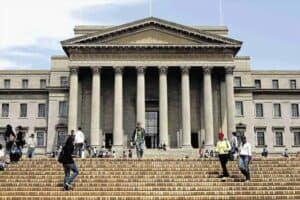The Department of Higher Education’s claim that it can’t act against institutions has been criticised.

ANC MP Tebogo Letsie, chairperson of parliament’s portfolio committee on Higher Education, says there is no justification for universities to favour hiring foreign academics over equally qualified South Africans.
His remarks followed a recent controversy involving the Central University of Technology (CUT) in the Free State.
The university faced backlash after appointing a foreign internal employee as dean over a black South African woman who reportedly holds a doctorate.
A video of Patriotic Alliance (PA) MP Ashley Sauls questioning CUT vice-chancellor Pamela Zibuyile Dube in parliament about the matter circulated widely on social media in April.
Watch the video below:
South Africa needs DOGE_SA like yesterday.
— Bearded Priest (@BeardedPriest1) April 25, 2025
Patriotic Alliance member of Parliament Ashley Sauls interrogates Vice-Chancellor of CUT for hiring foreigners over qualified citizens.
Parliament | #RHODurban | fafa | Bosa
Clement | Ukraine pic.twitter.com/AEM3PomrUv
Parliament on recruitment of foreign academics
Speaking during a media briefing on Monday, Letsie highlighted that the Employment Services Act required employers to ensure no suitable South African candidates are available before hiring foreign nationals.
“We place it on record that we are not xenophobic because there are others who are going to say we are xenophobic for saying our laws must be adhered to,” he said.
He further emphasised that hiring foreign nationals should not undermine job opportunities for equally qualified South African citizens, as outlined in the Policy Framework for the Internationalisation of Higher Education in South Africa.
“So the excuse by the Department of Higher Education that there is nothing they can do when institutions hire beyond the 10% foreign, international talent [threshold] … is just a fallacy.”
ALSO READ: Almost 90% of foreign government employees in health and education sectors, says DPSA
Letsie also highlighted that the framework affirms it is in South Africa’s best interest to appoint the most suitable candidates to academic positions at tertiary institutions, including qualified foreign nationals.
“We do need our international brothers and sisters, but it must not be a detriment to South Africans.”
He further stated that, according to the policy, tertiary institutions in the country have no valid grounds to favour foreign nationals.
“There can be no justification for any South African institution prioritising and preferring foreign nationals to South Africans who qualify equally for the same post.”
Referring to CUT, Letsie said: “There was an equally—if not more—qualified South African lady… was not given the job, and the excuse that we got from the leadership of the institution was that they prioritised an internal person.”
He argued that such reasoning should not be seen as a legitimate advantage.
Watch the media briefing below:
Higher Education department criticised
Letsie further said the committee was concerned about the attitude of departmental officials and their failure to take accountability regarding the “illegal” employment of foreign nationals.
“We can’t have a department that is soft and fails to hold the universities accountable.”
He added that if officials were unsure how to address the matter, perhaps it was time to “gracefully resign”.
READ MORE: Mashaba slams tertiary institutions for hiring foreign academics
The Department of Higher Education, according to Letsie, informed the committee during a meeting on 18 June that it would be engaging with university councils on the issue.
“While the committee fully supports attracting and retaining international talent, it does not support those done outside of the national legislation and policies.”
Seta board appointments
Letsie also revealed that the committee plans to recall Higher Education Minister Nobuhle Nkabane to answer questions regarding the appointment of Sector Education and Training Authority (Seta) boards.
Nkabane had faced criticism for refusing to disclose the identities of the independent panel members who recommended chairpersons for the Seta boards.
The controversy emerged after it was revealed that several appointees had ties to the ANC, including Minerals Minister Gwede Mantashe’s son Buyambo Mantashe, former KwaZulu-Natal (KZN) Premier Nomusa Dube-Ncube, and former ANC KZN deputy chairperson Mike Mabuyakhulu.
Though the appointments were subsequently withdrawn, Nkabane came under fire in parliament for withholding the panel members’ names.
Under increasing pressure from MPs and President Cyril Ramaphosa, she finally released the list on 17 June, which included her advisors and departmental officials.
READ MORE: ‘Gum-chewing’ minister goes viral, prompting conduct warning for South African MPs
However, Advocate Terry Motau, cited as the panel’s chairperson, denied involvement in the process.
Letsie remarked that Motau’s denial “raised more questions” about the integrity of the appointment process.
He said the committee has requested documentation from all panel members, including their correspondence with the minister, letters of acceptance, remuneration details, meeting minutes, and the final report that recommended the appointments.
Letsie confirmed that Nkabane and the panel members have been invited to appear before the committee.
“We don’t have a date yet because parliament is seized with a process of adopting the budget,” he said.
“We had identified a date which was this Friday, but because of the work of parliament, we could not get that particular date approved.”






